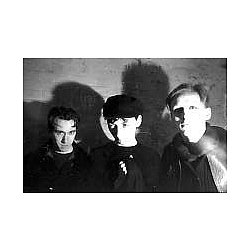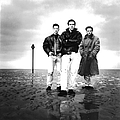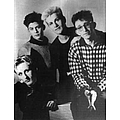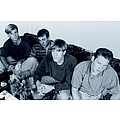Wild Swans Biography
The 'Wild Swans' were MK1. (1980-1982) Paul Simpson/Jeremy Kelly/Ged Quinn Mk2. (1985-1989) Paul Simpson/Jeremy Kelly/Joe Fearon Biography: Tumble from the sky... A Wild Swans flight log (taken from the 'Incandescent' sleeve notes) There were and always will be three core members of the Wild Swans: Jeremy Kelly (guitar), Gerard Quinn (keyboards) and Paul Simpson (vocals). Paul had played keyboards in The Teardrop Explodes - and Ged had replaced him for a while. Jeremy was the youngest member and this was his first serious group. They went through bass players at a rate of knots. A quick glance at the credits to this record shows a good 5 or 6 of them and that is but a fraction of the true count. Paul formed the band shortly after leaving Teardrop sometime in 1980. To start with the band just rehearsed. Messrs Kelly and Quinn played while Paul perfected the art of not actually singing anything. See his own notes for more on this peculiar art form. And suddenly here was something extraordinary: the Wild Swans sounded like nobody else on Earth. Neither Jem nor Ged had taken their NVQs in rock musicianship: Ged was, at that time, almost certainly the only keyboard player in the Western hemisphere NOT under the impression that he was Ray Manzarek. Precisely who Ged DID think he was is still a mystery and should probably remain so, but his keyboard playing throughout is simply extraordinary. The way his instruments and Jem's interact is something unique and like nothing that had gone before. Just listen to the piano playing on No Bleeding, Flowers of England, etc. and marvel. And throughout these recordings, listen to the way that the guitar and the keyboards have, in many ways, swapped their usual roles: in most rock music at that time the guitar occupied the middle of the sound, filling it out - remember, the most influential group in Britain at the time was Joy Division: upfront drums and bass, guitar mixed back but deep, menacing and other-worldly. And then listen to the Wild Swans: Bass practically inaudible, the guitar up at the very top of the sonic spectrum, playing melodically, often flirting with the vocal line, and then the keyboards, mainly piano and/or string synth, filling the sound out, often even carrying the rhythm, adding incredible dynamics and drama. And it's a warm sound, as opposed to the icy jags of synthesizer that had become de rigueur since people had heard Wire's Chairs Missing and 154 and then Joy Division‚s Closer. And the vocals were sung with a very English delivery when most British singers affected American accents. Every other band took much the same route: they went out and gigged, hoping to get noticed. Not our boys. They did at some point deign to go into a recording studio briefly and cut three tracks on the basis of some record company interest. Of these three tracks we've included an otherwise unreleased song called Infidel, as the historical artefact which it undoubtedly is. Then nothing much happened for a little while until Providence took a hand in the shape of one Peter Louis Vincent de Freitas. Paul knew the Bunnymen of old, of course and, when they finally saw some money, their drummer showed his faith in the Wild Swans by offering to fund a single. At the last minute the band's original drummer Justin Stavely was unable to make the session so Pete found himself playing on the single as well as producing and funding it. And having the then finest drummer in the whole world on the single certainly did no harm: listen to the US version of God Forbid if you need any further convincing. The Revolutionary Spirit / God Forbid 12" single came out on the legendary Liverpool label Zoo Records (catalogue number CAGE 009). It came in a plain dark blue sleeve with a line drawing of a swan on it - early copies also had the Lament of Icarus painting but this was removed from later pressings. Pete was credited as producer under the name 'Louis Vincent'. None of the other members' names appeared except the inner trinity's surnames as writers on the label. Bass player on the single was one Rolo McGinty, later of the Woodentops, though you'd never know it as the bass is almost totally inaudible. Oh and due to an, ahem, oversight by Mr de Freitas, the 'A' side was in mono. I can't think of another single with a mono 'A' and a stereo 'B' side. And that is just as it should have been, of course. When the Bunnymen toured America for the first time Pete took the master tapes along and remixed them with Talking Heads' engineer. An acetate was pressed up and one night the band members sat down, listened to both versions through just once each, all chorused "we like the first one" and that was that - I mean why would they need to listen to it a second time? Bang on. The mono version has a rush that is perhaps rather lost in the stereo version - fine though that is. This 'US version' was so legendary that I must admit that for a long time I thought it was probably apocryphal. But just as we were finalising the track list for this album Paul found an acetate in his record collection and brought it down to my place. So one night I gingerly put it on and... Well, I must say I felt like Howard Carter entering the tomb of Tutankhamen, the first man to set foot (in my case ear) there for 4000 years (OK, 20). There was the familiar intro - though it seemed shorter - then there was Paul singing "Lost in the Delta of Venus"‚ Pete's drums kicked in and yes, it was definitely different! By the chorus it had became very obvious that this version was in stereo, with acoustic guitars panned hard left and right... It's difficult to be objective about about a new version of what has been your favourite single of all time for over 20 years, of course, and I still do think the band made the right decision in choosing the mono version for release. So the stereo version is only the second best single ever made, if you see what I mean. OK, you'll have to forgive the odd little sonic problem but remember that this was taken from an acetate - a form of vinyl designed to be played a few times for test purposes and then discarded, not kept for 20 years and then used as a master source for a compact disc. But you won't mind that, will you? Think yourselves lucky to have this at all. Anyway, after recording this masterpiece the band managed to hang onto Rolo (different drummer though. As far as these boys were concerned a stable line-up would be something used by the police to identify a guilty horse) and went out on tour with the Bunnymen in December 1981. When we were hunting for material Will Sergeant happened to mention to Paul that he had a mixing desk recording from that tour... So what you have here is basically a full Wild Swans live set. Yes, I know there are only 6 songs. But they only HAD six songs at that time. They did pad out their set to a whopping seven numbers by doing Now You're Perfect twice: once fast, once slow. We've included just the slow one, as the fast version is represented by the studio version on CD1. Returning to Liverpool, there was a wait before the single was released and, in a burst of astonishing and never-to-be-repeated creativity, they actually managed to write as many as two new songs. Then David 'Kid' Jensen asked them to do a session for his BBC Radio 1 show in May 1982. They recorded two of the strongest tracks from their live set, Now You're Perfect and Fruits Of The Earth - now rechristened Flowers Of England - plus the two new ones, The Iron Bed and Opium. Only a couple of weeks later they were asked to do a session for John Peel's show. Ah. Bit of a problem there: they didn't have any songs left at all. Not finished ones, anyway. And you wouldn't get these boys making life easy for themselves by merely re-recording their single. But, nothing daunted, they all piled into a van again and drove down to London. They did only manage 3 tracks for that session and but as two of them were No Bleeding and Enchanted nobody thought of complaining and this was one of the first batch of Peel sessions to be chosen for release by Strange Fruit - an accolade if ever there was one. The world should‚ve been at their feet. It probably was only, of course, being the Wild Swans, their feet weren't where the world might've expected to find them (i.e. on the ground), so the world just said "oh well, nobody here...." went off and found someone else to adore. And then, as mysteriously as they'd appeared, they were gone. Nobody really knew how or why. They just weren't there any more. Then, with no more warning than the first time, they were back again. In 1985 interest was revived by the Peel session EP and, fortuitously, all three original members were between groups so they got back together again, recorded the really rather wonderful Janice Long session which opens CD2 of this album, featuring 2 versions of songs which ended up on the first Sire album, Northern England and Now And Forever, one - Crowning Glory - which later mutated into that album's Whirlpool Heart and one otherwise unrecorded (and excellent) song, Holy Spear, plus a series of demos which landed them a contract with Sire Records. Ged somehow drifted off, in a way which will surprise nobody who knows the man leaving Paul and Jem, plus bass player Joe Fearon (the Wild Swans Mk II stuck to one bass player, well, one presumes there simply weren't any more left after Mark I). Broken Home comes from these pre-Sire demos. The Mark II band made 2 excellent albums for Sire before calling it a day in the late 80s. These days Ged Quinn is a very fine painter with a fast-growing reputation in the art world, Jem Kelly is still recording with the Lotus Eaters and Paul Simpson has released 3 albums (the last being the truly stupendous Mind Lagoons)
Top Wild Swans Lyrics
Write a comment
What do you think about Wild Swans? Let us know in the comments below!













